CROSS PERSPECTIVES ON A MORE COORDINATED AND STRONGER INTERVENTION IN THE SAHEL
The third meeting of the Steering Committee (SC) of the Sahel Alliance took place on 24 June. This working session was well attended by representatives of the members and observers of the Sahel Alliance, as well as the G5 Sahel and the Mauritanian presidency of the G5.
A review of the achievements of this meeting and the prospects for interventions in the development sector through interviews of the participants:
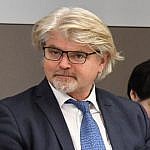 Christophe Rauh, Africa Director at BMZ and Chair of Sahel Alliance’s Steering Committee
Christophe Rauh, Africa Director at BMZ and Chair of Sahel Alliance’s Steering Committee
“We had a very good steering committee meeting, despite the difficult circumstances related to the Covid-19 crisis. We had discussions on crucial issues that allowed us to move forward in the work we are doing together within the Sahel Alliance. There were fruitful exchanges on the response to Covid-19, with an overview of the interventions. A sizable amount of 640 million euros has already been contributed by the members of the Sahel Alliance to assist in the response to the pandemic, with a commitment to do even more. In addition, one of the most important discussions we had, centred on fragile areas: our partners in the G5 Sahel’s Executive Secretariat presented a strategy outlining the intervention orientations of the G5 Sahel countries. We can therefore align our political activities with this document through an integrated territorial approach that defines the areas in which the members of the Sahel Alliance could work together by establishing a close dialogue on the ground. ‘’
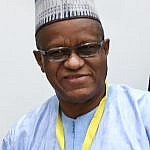 Maman Sidikou, Executive Secretary of G5 Sahel
Maman Sidikou, Executive Secretary of G5 Sahel
“The third steering committee of the Sahel Alliance was a constructive meeting. The participants contributed to the holding of a tangible and concrete session. I am particularly pleased with the progress achieved in 3 priority areas. First of all, the convergence of the Sahel Alliance towards the model of the integrated territorial approach, which had already been mentioned at the General Assembly of 25 February in Nouakchott. Secondly, the issue of financing instruments for development projects. We cannot wage the war for development without a strategy or relevant and easily mobilized resources. A long time ago, when I was working on the issue of adult education during my doctoral thesis, I was in Burkina Faso with peasants and they would often ask me: “plan, plan, … what are you talking about? ». We need funds and instruments. We must therefore be careful not to become entangled in endless procedures. The third point relates to the use of local operators for the implementation of interventions. This is essential for appropriate and sustainable development. We need to find the right formulas in the Sahel. We have begun to talk about this, and dialogue must continue with our partners in the Sahel Alliance. Sometimes people think that when we talk about local operators, only international organizations can work there, but it is necessary to dig a little deeper and create other partnerships focused on implementation and the ” percolation of development aid to the bottom of the pyramid”.
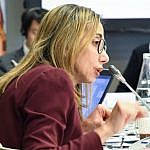 Rima Lecoguic, Africa Director, AFD
Rima Lecoguic, Africa Director, AFD
“The members of the Sahel Alliance have a strong ambition, with a roadmap including modalities and modus operandi to achieve progress in the response to the crisis. All member states are aligned and we are aligned with the G5 Sahel and its chairmanship. Everything is now very clearly aligned with the need to mobilise more strongly and to work in a coordinated manner, to carry out joint programming, to change our modus operandi. We have clearly affirmed the will to work more closely with local authorities and national governments and to have greater coordination on the ground.
In terms of interventions, we are already present in the three-border zone, but we need to expand our presence in several localities in Niger, Burkina Faso and Mali. And then continue to work in localities that are less threatened by conflicts and terrorists. So, from a preventive point of view but also from the perspective of stemming the crisis because there are many displaced people in these areas as a result of conflicts. In Burkina Faso, there are nearly 900,000 displaced persons, which is enormous. We must respond to the needs of these people in all areas, including social safety nets, basic services, food security…”.
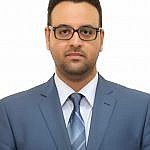 Nani Mohamed Salem, Director General of Financing , Public Investments and Economic Cooperation
Nani Mohamed Salem, Director General of Financing , Public Investments and Economic Cooperation
“The Executive Secretariat of the G5 Sahel and the conference of ministers are working in perfect coordination and cooperation. They intend to work in the same way with the coordination unit of the Sahel Alliance in Brussels, but also with its representatives in the G5 Sahel countries. The G5 Sahel welcomes the idea of the Sahel Coalition to optimize and link approaches to security, governance and development. This is extremely important. The President of the G5 Sahel Council of Ministers has a strong interest in the prospect of creating a new financial instrument to operate the rapid reaction facilities. This initiative is scheduled for early 2021. This new instrument should be flexible and adapted to the contexts and realities of the Sahel. A good coordination is necessary with the trust funds slated for the stabilization of the Sahel to support the implementation of the emergency plans of the priority action framework, the CAPI. This is therefore a priority for the G5 Sahel. ‘’
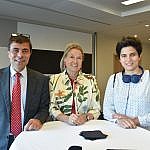 Sandra Krammer, Marc Stalmans and Pauline Guibaud, DEVCO – EU
Sandra Krammer, Marc Stalmans and Pauline Guibaud, DEVCO – EU
“We need to work together because the crises in the Sahel are complex and multifaceted. There is not only a security crisis, there is also a health crisis due to the COVID pandemic as well as a food security crisis. These challenges are occurring in countries that are already very fragile. The Sahel Alliance is a platform that has a firepower that can only be effective if we work together on the ground. Our hope is that the Sahel Alliance will continue to coordinate efforts better and to a greater extent, while also stepping up collaborative work on the ground.
It is important to focus on the various crises, particularly the security crisis. With that in mind, we must direct our efforts to the most complicated regions from a security point of view, something that the Alliance has perhaps not done as much recently. It is more complex because it requires simultaneous work on security, development and humanitarian aid. But it is absolutely critical for the Alliance to be at the centre of this discussion and coordination for an intervention in the most challenging locations in the G5 Sahel. ”
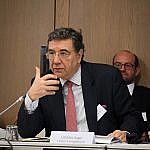 Angel LOSADA, EU Special Representative for the Sahel
Angel LOSADA, EU Special Representative for the Sahel
“Ownership on the part of our African partners is essential. Without them, we are going nowhere. This is why we have two instruments that were strongly highlighted during this steering committee, namely the Priority Action Framework (CAPI) that was developed by the Executive Secretariat of the G5 Sahel with a firm will to show their priorities. We also emphasized the issue of the integrated territorial approach. We need greater coordination not only among ourselves, but also with the various stakeholders present in the field.
During this steering committee, the structure of the Sahel Coalition was clarified. It is a light coordination structure, and the Sahel Alliance belongs to Pillar 4, which is dedicated to development. All the members agreed to move in that direction and to strengthen this function, which will enable us to have a Sahel Alliance that is both much more compact and much stronger, well-coordinated with the other pillars, in order to preserve a fundamental element of the nexus between security and development. Finally, I would like to congratulate the Chairman of the Steering Committee, Mr. Christophe Rauh (BMZ) who has been re-elected and the Spanish Minister of Foreign Affairs who has been appointed President of the General Assembly (GA). She had also participated in the first GA of the Alliance chaired by Minister Le Drian who played a fundamental role in giving impetus to and demonstrating the vitality of the Sahel Alliance. ”
—
For more information on the latest Steering Committee of the Sahel Alliance, click here.
Find the full interview of Maman Sidikou, Executive Secretary of the G5 Sahel through this link

